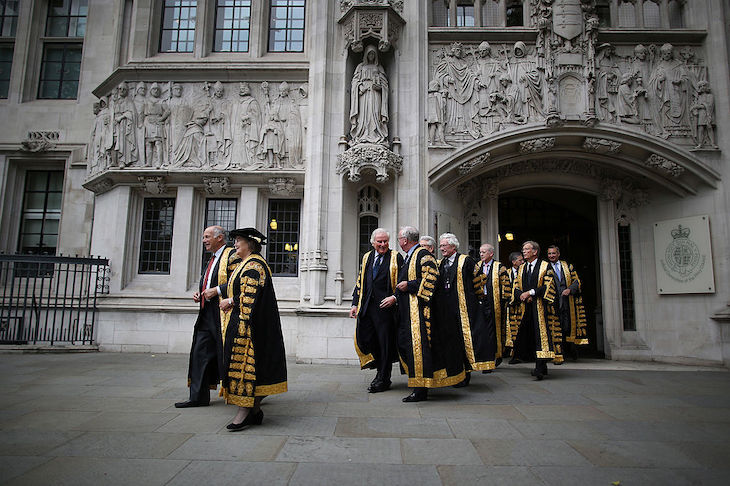Proceedings in the Supreme Court are typically being reported as if judges are making an impartial assessment of the constitution. It would be more true to say that they are asking whether or not to give themselves more power. Perhaps they will uphold the established constitution, or perhaps they will concoct sophisticated legal-soundings reasons for appropriating the powers that lawfully belong to parliament and the people themselves.
Only recently, the most senior judges understood clearly what was at stake. Lord Bingham, who retired as a judge in 2008 having been Master of the Rolls, Lord Chief Justice and Senior Law Lord, said in his book The Rule of Law, that:
‘The British people have not repelled the extraneous power of the papacy in spiritual matters and the pretensions of royal power in temporal in order to subject themselves to the unchallengeable rulings of unelected judges. A constitution should reflect the will of a clear majority of the people.’
Constitutional changes, he concluded, ‘should be made in accordance with that will or not at all’. His view is central to the Universal Declaration of Human Rights of 1948, which says that ‘The will of the people shall be the basis of the authority of government’.
Historians have shown that this notion has long been part of our political culture. Citizens in the eighteenth century, when only a few had the vote, who were dissatisfied with Parliament did not appeal to judges. Instead, they petitioned the King, not to overrule Parliament, but to dissolve it to force an election so that public opinion could assert itself. For example, in 1773 the King was petitioned in protest at the exclusion of the infamous John Wilkes from Parliament. The petitioners argued that their elected representatives: ‘who were chosen to be the guardians of our rights, have invaded our most sacred privileges … We therefore… supplicate your majesty to employ the only remedy now left by the Constitution, the exercise of that salutary power with which you are entrusted by law, the dissolving of the present parliament.’ The claim that an election was the ‘only remedy’ often featured in petitions of the period.
One of the most revered principles of natural justice, and long part of our common law, is nemo judex in causa sua, usually translated as ‘no one should be a judge in their own cause’. But when judges decide to add to their own powers at the expense of Parliament, the government or the people themselves, they plainly act as judges on their own behalf.
It is accepted that if a judge has a financial interest in a case he must withdraw. Judges are also supposed to withdraw when the interest is non-pecuniary, for example, if they have a commitment to a political cause. This kind of conflict arose in the Pinochet case that came before the Law Lords in 1999. Lord Hoffmann was found to have sat on the first Pinochet case when his wife had worked for Amnesty International since 1977 and when he was himself an unpaid director and chairman of Amnesty International Charity Limited. Lord Hutton said:
‘there could be cases where the interest of the judge in the subject matter of the proceedings arising from his strong commitment to some cause or belief or his association with a person or body involved in the proceedings could shake public confidence in the public administration of justice as much as a shareholding (which might be small) in a public company involved in the litigation.’
Lord Hope agreed:
‘I think that the connections which existed between Lord Hoffmann and Amnesty International were of such a character, in view of their duration and proximity, as to disqualify him on this ground. … he could not be seen to be impartial. … his relationship with Amnesty International was such that he was, in effect, acting as a judge in his own cause.’
When judges assume office they currently swear by almighty God to ‘do right to all manner of people after the laws and usages of this realm, without fear or favour, affection or ill will’. Ruling against the government in the prorogation case would be to effectively take sides in a political dispute.
David Green is CEO of Civitas






Comments